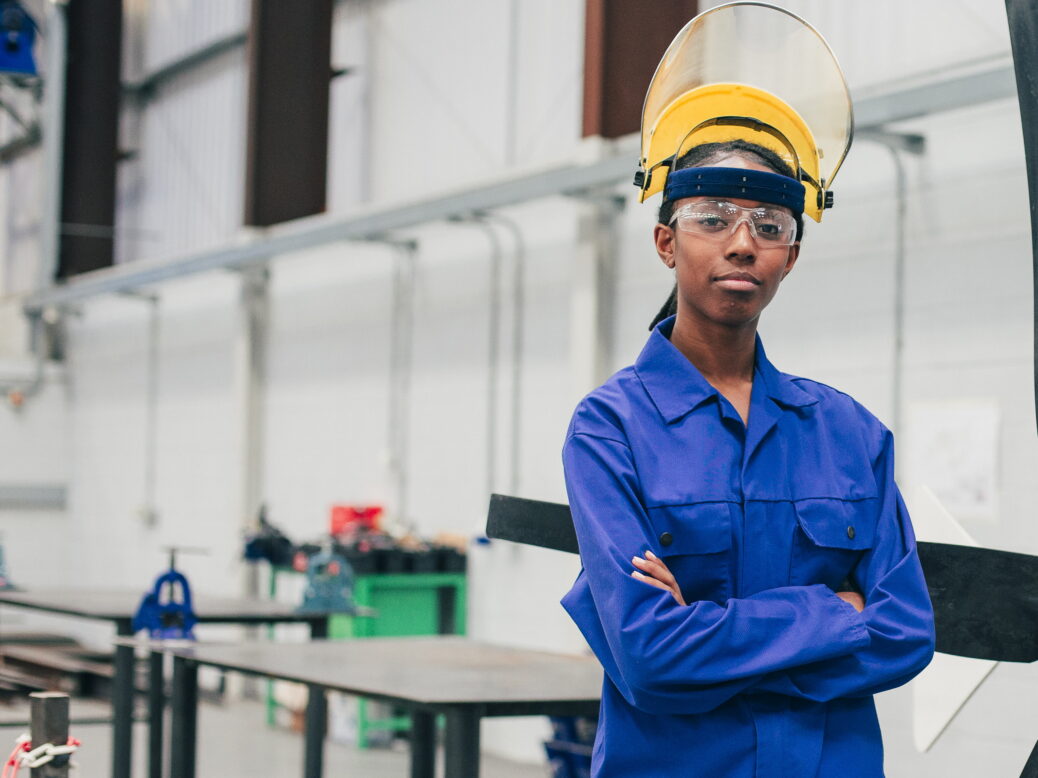
Virtual and augmented reality technologies are not new in the energy sector. Smart glasses have gained traction in recent years, for example, with oil-rig workers who regularly share what they physically see with onshore specialist teams to troubleshoot problems.
Today, however, at a college in West Wales, virtual reality is being used in an innovative way by a new group of energy pioneers. The first cohort of students has started at this energy transition skills hub, the largest facility of its kind in the UK.
It is a wet Friday morning in late September. Inside the hub students and teachers are exploring their new immersive classroom. Clutching headsets, viewers interact with their surroundings in virtual energy projects.
Banks of digital screens also let them experience real-world control rooms. They can “set foot” on a floating wind project, support vessels and onshore energy plants.
The hub, supported by Shell UK and Pembrokeshire College, is one of three opening its doors across the UK by September 2025. It aims to provide a pool of talent with knowledge and experience for the future energy system.
Plugging the skills gap
“We’re seeking to address a wider issue to ensure progress in the energy transition,” says Anthony Harte, head of social impact at Shell UK. Speaking at the launch of the Pembrokeshire hub, Harte says this skills challenge sits at the heart of the UK government’s mission to raise the country’s growth prospects.
“We are working with our partners to build energy transition skills hubs so that students can learn and refine critical energy industry skills. This is because, even though we continue to make progress in the energy transition, there is a significant challenge emerging to ensure the UK has the energy workforce it needs.”
He adds: “Addressing this requires upskilling, reskilling and empowering a new generation of energy professionals.”
The “green workforce skills gap”, as it’s sometimes known, is a significant challenge to the UK’s ambition to achieve net zero emissions by 2050.
A report commissioned by the National Grid, for example, said the UK’s energy sector will have 400,000 roles in the net zero workforce. Of this, 260,000 will be in new roles, while 140,000 will be replacing those who have left the workforce. A report by the Local Government Association found that by 2030 there could be as many as 694,000 direct jobs employed in the low-carbon and renewable-energy economy, rising to over 1.18 million by 2050.
However, while many existing workers, with some upskilling, have qualifications or experience to transition into these roles, the younger generations are often unprepared through current traditional educational routes.
The government is already using industrial strategy, reforms to education and skills provision, as well as closer industry collaboration to build the energy system of the future.
But to truly bridge the skills gap, an overhaul of education and training programmes is essential. Research shows that only around 7 per cent of people receive any dedicated skills development, and less than 30 per cent have heard of “green skills”.
Vocational training and apprenticeships focused not only on theoretical knowledge but also practical skills – such as those taught in the Pembrokeshire hub – related to renewable technologies and sustainable practices, will therefore play a pivotal role in the transition.
Well-trained net zero workforce
Shell UK has developed its SkillsTransition programme, which aims to help 15,000 people into jobs with a focus on the energy transition by 2035. Working in collaboration with further education colleges, its energy transition skills hubs provide teaching space and equipment demonstrating the latest energy technologies.
They offer students the chance to learn skills, from welding and fabrication to engineering in energy projects.
At Shell UK’s second hub, in Fife College in Scotland, students will soon get an immersive, hands-on experience of a nanogrid, a self-contained energy system that relies on its own energy source such as renewable power.
A third hub, at the North East Scotland College in Aberdeen, will focus on welding and engineering skills. It aims to help 2,700 learners and support people in jobs across five years, and is expected to open its doors in 2025.
Opportunity for everyone
Shell UK has had a significant presence in the UK dating back 125 years, and has played a role in social impact related to skills since 1982 when it launched the first Shell LiveWIRE in Scotland, which helped tackle youth unemployment.
Today it continues to invest in developing skills for the future workforce, providing more than 2,000 unique courses and programmes in 2022, representing around 72,000 hours of training in the UK.
Welcoming the start of classes in the new Pembrokeshire skills hub, Harte says: “We want as many people as possible to benefit from the energy system of the future. And we’ve seen this coming to life in Pembrokeshire. For us, it is the latest important step to ensure the energy transition is an opportunity for everyone.”
To find out more, visit shell.co.uk/ jobs-and-skills



